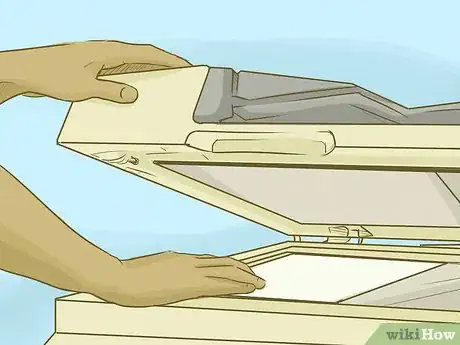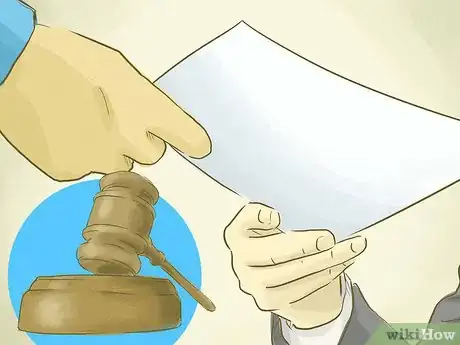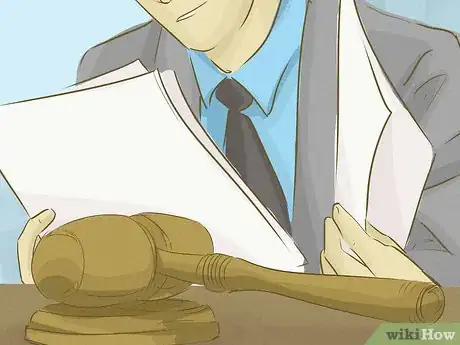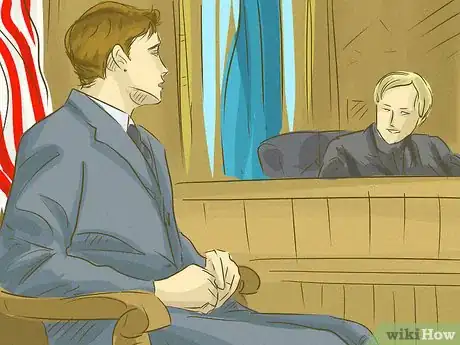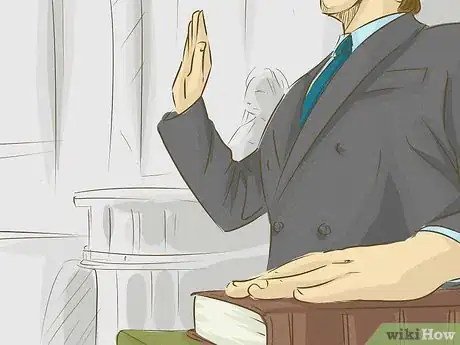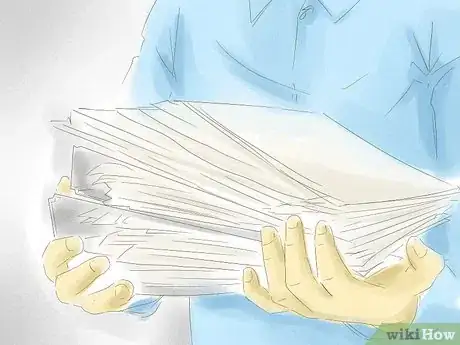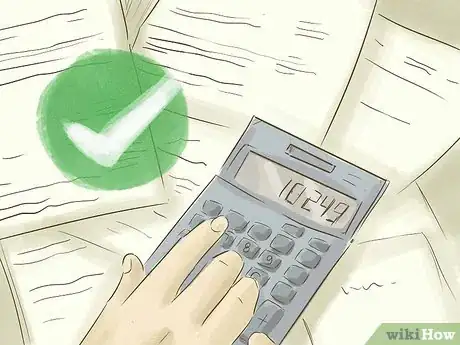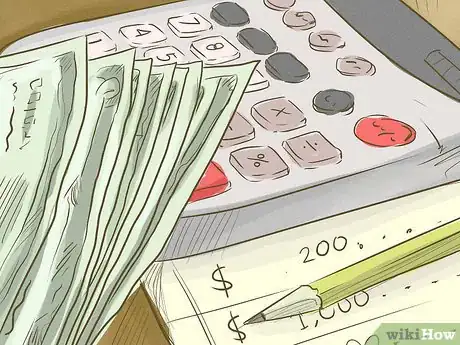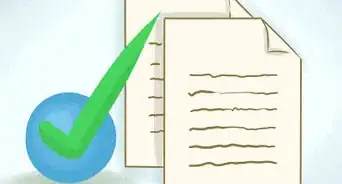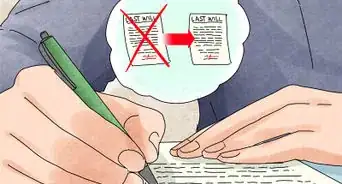This article was co-authored by Clinton M. Sandvick, JD, PhD. Clinton M. Sandvick worked as a civil litigator in California for over 7 years. He received his JD from the University of Wisconsin-Madison in 1998 and his PhD in American History from the University of Oregon in 2013.
There are 10 references cited in this article, which can be found at the bottom of the page.
This article has been viewed 124,917 times.
A will is a legal document that outlines the final decisions or instructions of an individual upon death. An individual’s will primarily deals with their assets and how they will be distributed upon their death. The probate process oversees the disbursement and management of the estate, or all of the property belonging to the deceased individual. Although the legal process to probate a will varies according to your state and county, the same basic process applies to most estates.
Steps
Starting the Probate Process
-
1Learn some basic terminology. If you don’t know how wills and estates work, you may need to learn some key vocabulary. It’s not necessary to become a legal expert overnight, but you should familiarize yourself with the following terms:
- Estate – everything that the deceased person owned, consisting of both real and personal property
- Real property – land, buildings, and other permanently fixed items belonging to the deceased
- Personal property – movable assets (furniture, clothing, jewelry, etc.) belonging to the deceased
- Petition – a formal written request asking the court to oversee the distribution of the estate
- Executor or Personal Representative – a person appointed by an individual to administer their estate after death; if you are seeking to probate a will, you probably have been named as the executor of the estate in the deceased person’s will
- Administrator – a person appointed by the court to oversee the affairs of an estate if someone dies intestate, or without a legal will
- Heir – a person named in a will who is to receive part of a deceased person’s estate
- Creditor – a person to whom a deceased person owes a debt
- Decedent – the deceased person, or the person who wrote the will
-
2Understand the role of an executor. This role carries a great deal of responsibility and legal liability. An executor is responsible not only for overseeing the estate, but also for finding and protecting assets belonging to the estate.[1]
- A person typically is named as an executor in a will. The testator, or person making the will, names the executor as the person that they want to administer their estate after death.
- In some cases, a will designates two people to act as co-executors of the estate. A will also may provide for a secondary, or back-up, executor, just in case the first person who is named executor is deceased or otherwise unavailable or unwilling to act as executor.
Advertisement -
3Consider hiring an attorney. Probate proceedings can be complex, particularly if someone challenges the will or your role as executor of the will. Some states or counties have probate forms that you can fill out on your own, but other states or counties do not. It can be difficult to handle an estate correctly without the guidance of an experienced probate attorney. Typically, the attorney’s fees can be paid out of the estate assets or property.
-
4Get multiple copies of the death certificate. Not only will you need a copy of the death certificate in order to file a petition for probate with the court, but you also will need copies for other entities, including banks, creditors, and the Social Security Administration. You typically can get a copy of a death certificate from your state records office. There is also likely to be a fee for getting copies of a death certificate.[2]
- Using the death certificate, you should notify relevant entities of the testator's death. You should notify the Social Security Administration first, and then banks and other businesses to whom bills may be owed, such as utility companies and mortgage companies.
-
5File a petition for probate. If you are the executor of someone’s will, your first step will typically be to file a petition to probate the will. You should file the original and at least two copies of this petition, so that you can keep a file-stamped copy for your records. Essentially, this petition asks a probate court to establish that the will is legal and valid, name you as executor, and grant you permission to distribute assets according to the will. When you file the petition, you also must provide the court with both the decedent’s death certificate and their original will.[3]
- Note that this petition must be filed with the probate court located in the deceased person’s county of residence.[4]
- You should file the probate petition, will, and death certificate as soon as possible after the person’s death.
- You will be required to pay the court’s filing fee. The amount of this fee varies widely from state to state and county to county, but is likely to be in excess of $100.
- If you live in a state that has adopted the Uniform Probate Code (UPC) and do not expect anyone to contest the will or your role as the personal representative, you may have the option of filing a petition for informal probate or administration of the will. This avenue lets you bypass a court hearing in favor of simply filing paperwork. Those who receives assets from an informal or summary administration may be liable for claims from creditors for up to two years. Informal administration is generally reserved for estates with values of less than $100,000 and little or no debt.[5]
- As of 2014, the states that use the UPC include Alaska, Arizona, Colorado, Florida, Hawaii, Idaho, Maine, Massachusetts, Michigan, Minnesota, Montana, Nebraska, New Jersey, North Dakota, South Carolina, South Dakota, and Utah.
- Another potential option under the UPC is referred to as succession without administration or small estate. This option is only available for estates that contain solely assets that are exempt from creditors. The total value of the estate’s non-exempt property, or property that is subject to creditors’ claims, must not be more than the costs of paying medical bills for and burying or cremating the decedent. These are the expenses that typically must be paid first in an estate.
-
6Notify interested parties of the probate petition. Once you’ve filed the petition for probate with the court, you are required to inform heirs and creditors about the proceedings. If possible, send official letters to the current addresses of all of these people. Otherwise, try to get a current address by reaching out to them by telephone or through email, and, as a last resort, mail notices to last known addresses.
- Legal formalities regarding this notification process vary from state to state. Make sure to check your state’s specific laws to ensure that you notify each appropriate person in the correct and legal manner.[6]
- Some states require that you draft a Notice to Creditors document that contains specific information about the estate and can be issued by the court.
- In some states, you will have to mail notices to interested parties yourself, usually by certified mail, return receipt requested. In other states, the Clerk’s office for the court will mail the notices for you.
-
7Publish a notice in the newspaper. In addition to sending individual notifications, you’ll need to publish a newspaper notice in the city or town where the deceased person lived. Doing so allows potential creditors or other interested parties, some of whom you may not know about, to be made aware of the probate court proceedings and participate if they wish.
- Depending on your state, you are likely to be required to show the probate court proof that you have notified all of the appropriate people and published a notice. If this is the law in your state, you’ll need to do so before your hearing can be scheduled.[7]
-
8Schedule a probate hearing. After you file the probate petition, contact interested parties, and publish a notice in the newspaper, you can ask the court to schedule a hearing. The primary purpose of this hearing will be to validate the will, and, if there are no objections, to make you the official executor.[8]
- Note that it may take weeks or even months for your hearing to be held. Some court dockets, or schedules, are very busy and may not have a time slot available for your case for a long period of time. This timeline varies from state to state, as well as from county to county.
Handling Formal Legal Proceedings
-
1Post a bond if necessary. In some states and counties, you will be required to post a bond with the court as the executor of the estate. The amount of the bond will depend on the size of the estate. The purpose of requiring a bond is to protect heirs, beneficiaries, and creditors from any losses that you cause, either intentionally or accidentally.[9]
- If you are at all concerned about posting a bond or your role as the executor, you should speak to an attorney. They can help you understand the particular rules in your state and county, as well as your specific rights and responsibilities.
-
2Validate witness signatures. The court also may require that anyone who witnessed the will sign a declaration attesting to its validity. This declaration is a legal document; if any false information is given, the witness commits perjury.
-
3File any other documents required by the court. As with other aspects of the probate process, the specific documentation that your probate court requires will vary by state, and sometimes by county, as well. If your court requires additional documentation, you will need to file it with the court before your hearing.
-
4Attend the hearing. Most probate hearings are relatively straightforward. The court will establish basic facts about the decedent’s date of death and county of residence and will determine the validity of the will. You will be named the official executor and granted permission to distribute the decedent’s property as specified in the will.[10]
- In states that have adopted the UPC, you may not need to attend a formal hearing at all. In these states, if no one contests or objects to the will, everything can be handled through paperwork alone.[11]
- If, during the course of the hearing, a judge rules the will to be invalid, it will be declared void. In this case, you will no longer serve as executor, and all the decedent’s property will be distributed according to the state’s laws of intestacy. These laws regulate the distribution of property when a deceased does not leave a valid will behind.[12]
Dealing with Contested Probate Proceedings
-
1Understand that interested parties can contest the will. In some cases, probate hearings are much less straightforward. Potential heirs, beneficiaries, and creditors may contest the will itself and/or your role as the executor. These situations can become very complicated, and because they often involve friends and family members of the deceased person, they can also be highly emotional. Interested parties might contest the probate process for a number of reasons. These include: [13]
- The individual feels entitled to a larger share of the estate than the will provides.
- The person believes that the deceased person was coerced, tricked, or unfairly influenced when they created the will.
- The individual suspects that the will does not conform to certain legal requirements.
- The person thinks that someone else would be a more capable executor than you.
-
2Defend against objections. If one or more interested parties do contest the probate, you will be tasked with defending both the will itself and/or your appointment as executor. Depending on the complexity of the situation and the timing of the objections, the judge will either make decisions at the hearing or schedule a second hearing to handle the developments.[14]
- One of the most common contested probate situations occurs when a would-be heir objects to the distribution of assets as outlined in the will. Although some states have specific laws providing for a deceased individual’s spouse, in general, a person can choose to leave their assets to anyone. Therefore, in this case, the judge is likely to be concerned only with the validity of the will itself. Your job will be to show, through witnesses and any other evidence, that the will conforms to state law and represents the true intentions of the decedent.[15]
- A less common reason for a contested probate process involves the legal concept of escheat. This situation occurs in cases in which the government may have the right to some or all of the decedent's property. This situation typically arises when there are no living heirs, but depending on your state, there may be circumstances in which the government takes an interest in the distribution of the decedent's assets. In such cases, your job will be to show that the will is valid and that there are legal heirs who are entitled to the deceased person's property, other than the government.[16]
-
3Consult an attorney for advice. Even if you don't feel that you need an attorney to handle the entire probate process, you may wish to consult an attorney for advice if you receive an objection to the will or to your appointment as executor. These proceedings can quickly become very complicated and you should at least get an attorney's opinion as to how to handle the matter before acting.
Settling the Estate
-
1Gather relevant information. Once the hearing or the required paperwork is complete, you must settle the estate by paying creditors, disbursing property, and closing the estate. To do so, you’ll need to obtain the following information:
- An employer identification number from the IRS in order to handle taxes on behalf of the estate
- A list of the deceased person’s assets
- A list of all known creditors and the amounts of their claims
- A list of all other legal obligations required by your particular probate court[17]
-
2Open a bank account for the estate. You’ll need a bank account to use for estate purposes only. Having this account keeps estate assets and liabilities completely separate from your own, which is typically required by law.[18]
-
3Appraise and inventory all assets. Before anything can be paid or distributed, you’ll need to have items of value appraised, generally by a licensed appraiser. This process will give you an accurate idea of the estate’s value, how much will be paid to creditors, and how much each heir will receive. Categorize each asset according to its exempt status.[19]
- Exempt assets are those items of property that under state law cannot be taken by creditors to pay off the decedent’s debts. These assets typically include real estate up to a certain value and a specific amount of personal property.
- Some assets fall outside of the probate estate because they specifically name a beneficiary to receive them upon the individual’s death. These assets might include 401(k) plans, life insurance policies, pensions, and joint bank accounts. Assets that fall outside of the estate altogether are also exempt assets.
- Non-exempt assets are those items of property which a creditor can claim in order to repay debts owed by the decedent.
-
4Compute the value of the non-exempt estate assets. Do not include any exempt assets, including those assets that fall outside of the estate. The amount of the non-exempt assets will used first to pay the claims of creditors, in order of their priority. Any remaining non-exempt assets will be distributed to the heirs according to the will.
-
5Pay creditors. You must evaluate creditor claims in accordance with the laws of your state and county. For valid claims, or those that are legitimate and can be verified, you will need to pay creditors promptly. This may require you to liquidate some assets, or reduce them to cash, if needed, in order to pay the bills.
- Your state may have a designated period of time, or the “creditor’s claim period,” during which creditors can file their claims. You will need to wait until this period has passed before you distribute any assets that might otherwise go to a creditor.[20]
- If you doubt the validity of certain creditor claims, you may need to consult an attorney for advice.
-
6Handle the estate’s tax obligations. Estate taxes can be confusing, so it’s best to consult with an accountant who is experienced in handling these issues. Depending on the value of the estate, you may need to deal with both federal and state taxes. State laws vary considerably, but, in general, if the estate’s value is higher than a certain amount, you’ll have to file a state tax return in addition to a federal tax return.[21]
-
7Get permission from the court to distribute remaining assets. When the creditor’s claim period is over and you’ve paid all the estate’s outstanding obligations, you can get the court’s permission to begin distributing property to heirs.[22]
- Your probate court may require you to mail additional notices to interested parties before you can close the estate. You should check with the court to find out if you are subject to any additional requirements.[23]
-
8Distribute remaining assets as designated by the will. Once all of the estate’s obligations are paid, you can distribute remaining cash and property to heirs, as directed by the will and/or the court.[24]
- Documentation is crucial, so be sure to get receipts for all of the property that you distribute. Keep accurate records in case you are asked to provide them to the probate court.[25]
-
9Follow up with the probate court. When you have distributed all property, file any required documentation with your court. At this point, if everything is in order, the court will release you from your duties as executor of the estate.[26]
-
10Close the estate. Once all assets are distributed to the appropriate heirs and financial obligations have been paid, you can close the estate. While the process of closing an estate may differ according to state law, certain actions must be taken in all states in order to properly close an estate. These actions include:
- Prepare an accounting of the estate assets and how they were distributed, including any proceeds remaining in the estate bank account.
- File the accounting with the probate court. Assuming there are no outstanding or unusual issues, the judge will issue an order formally closing the estate.
- Close the estate bank account once all checks have cleared. This is typically the last step to take when closing out an estate.
References
- ↑ http://executor.org/plan/role-and-responsibilities/duties-of-an-executor/
- ↑ http://executor.org/plan/file-will-and-obtain-death-certificate/getting-certified-copies-of-the-death-certificate/
- ↑ http://legal-dictionary.thefreedictionary.com/Probate+of+a+will
- ↑ http://www.nolo.com/legal-encyclopedia/how-probate-process-works-information-32438.html
- ↑ http://www.nolo.com/legal-encyclopedia/how-probate-process-works-information-32438.html
- ↑ http://www.nolo.com/legal-encyclopedia/how-probate-process-works-information-32438.html
- ↑ http://www.nolo.com/legal-encyclopedia/how-probate-process-works-information-32438.html
- ↑ http://legal-dictionary.thefreedictionary.com/Probate+of+a+will
- ↑ http://www.nolo.com/legal-encyclopedia/how-probate-process-works-information-32438.html
- ↑ http://legal-dictionary.thefreedictionary.com/Probate+of+a+will
- ↑ http://www.nolo.com/legal-encyclopedia/how-probate-process-works-information-32438.html
- ↑ http://www.nolo.com/legal-encyclopedia/how-probate-process-works-information-32438.html
- ↑ http://estate.findlaw.com/probate/the-probate-basics.html
- ↑ http://legal-dictionary.thefreedictionary.com/Probate+of+a+will
- ↑ http://legal-dictionary.thefreedictionary.com/Probate+of+a+will
- ↑ http://legal-dictionary.thefreedictionary.com/Escheat
- ↑ http://www.nolo.com/legal-encyclopedia/how-probate-process-works-information-32438.html
- ↑ http://www.nolo.com/legal-encyclopedia/how-probate-process-works-information-32438.html
- ↑ http://www.nolo.com/legal-encyclopedia/probate-faq-29135-2.html
- ↑ http://www.nolo.com/legal-encyclopedia/how-probate-process-works-information-32438.html
- ↑ http://www.nolo.com/legal-encyclopedia/state-estate-taxes.html
- ↑ http://www.scscourt.org/self_help/probate/property/closing_distributing.shtml
- ↑ http://www.nolo.com/legal-encyclopedia/how-probate-process-works-information-32438.html
- ↑ http://www.legalmatch.com/law-library/article/residuary-estate-legal-issues.html
- ↑ http://www.nolo.com/legal-encyclopedia/how-probate-process-works-information-32438.html
- ↑ http://www.nolo.com/legal-encyclopedia/how-probate-process-works-information-32438.html



